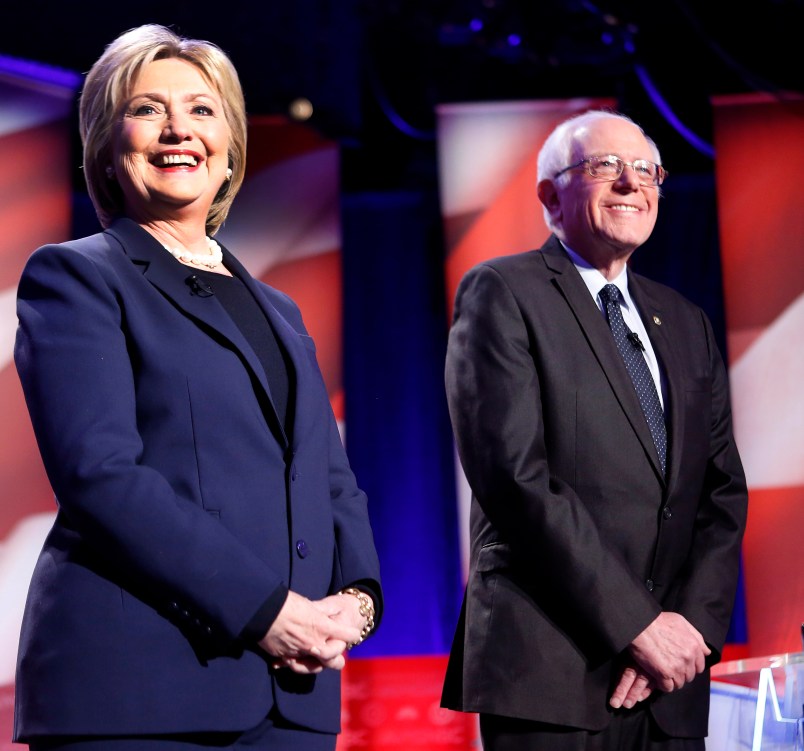Going mano a mano against Bernie Sanders — and days after they essentially tied in Iowa — Hillary Clinton’s performance at Thursday’s MSNBC debate reflected someone who no longer thought her nomination was inevitable. Her attacks were sharper, she responded to his criticisms more directly and she pushed new arguments that she had been holding back so far in the campaign.
Here are five things that changed during Thursday’s debate.
She turned her attacks towards Sanders now, rather than Republicans in the future.
In previous debates, Clinton positioned her answers as attack lines she could use against Republicans in the general, rather than responses to Sanders in the primary.
Thursday, she was more focused on taking every swing at Sanders she could, and when she did bring up Republicans, it was to suggest that Sanders was not strong enough to take them on.
“I think it’s fair to say that whoever is in that position, Senator Sanders or anyone else who might have run, will face the most withering onslaught,” she said. “So, I think that I am the person who can do all aspects of the job. I think I’m the person best prepared to take the case to the Republicans.”
She shifted from bemused tolerance of Sanders policy proposals to challenging them aggressively.
For the first few months of the campaign, Clinton seemed sensitive to the optics of beating up on the lovably grumpy socialist from Vermont and thus sought to get the tenor above the fray. Thursday’s she showed a willingness to engage Sanders more directly, not only willing to call out certain policy positions of Sanders — namely his gun rights record or his health care plan, as she has done in the past — but she treated Sanders as an adversary whose message of “revolution” was not just far-fetched, but dangerous to the larger goals of the Democratic Party.
From the get-go, she laid into Sanders’ single-payer health care proposal and his promise of free college, calling them “just not achievable.”
“I’m not going to tell people that I will raise your incomes and not your taxes, and not mean it,” she said later on. “I don’t want to see the kind of struggle that the middle class is going through exemplified by these promises that would raise taxes and make it much more difficult for many, many Americans to get ahead and stay ahead. That is not my agenda.”
She stopped brushing off Sanders’ attacks on her and accused him directly of playing dirty.
In race where both candidates have said they were committed to discussing the “issues” and have largely refrained from personal attacks, Clinton framed Sanders’ criticisms of her Wall Street ties as personal attacks that should be beneath him.
“Senator Sanders says he wants to run a positive campaign. I’ve tried to keep my disagreements over issues, as it should be,” Clinton said. “Time and time again, by insinuation, there is this attack that he is putting forth, which really comes down to, you know, anybody who ever took donations or speaking fees from any interest group has to be bought. I just absolutely reject that, Senator. I really don’t think these kinds of attacks by insinuation are worthy of you.”
In past encounters with Sanders, Clinton has tolerated his insinuations, but tonight she called him out for the “artful smear.”
“Enough is enough. If you’ve got something to say, say it directly,” she challenged.
She not so subtly suggested that Sanders wasn’t ready to be commander in chief.
In almost a sequel to the “3 a.m. Phone Call” ad she ran against Barack Obama in 2008, Clinton re-invigorated her claim that she had the experience to deal with the crises that will face the next president, with the subtext that Sanders — who struggled in the foreign policy portion — didn’t.
“When New Hampshire voters go on Tuesday to cast your vote you are voting for a president and commander chief,” she said. “There’s no way to predict what comes in the door of that White House from day to day that can pose a threat to the United States.”
She rejected the “establishment” label by embracing the possibility of becoming the first female president.
The thrust of Sanders entire campaign is that he is running against the political establishment and he has framed Clinton as a product of that establishment. Thursday, Clinton rejected that characterization in a way that will be difficult for Sanders to rebut.
“Senator Sanders is the only person who would characterize me, a woman running to be the first woman president, as exemplifying the establishment,” she said. “It’s really quite amusing to me.”







The “establishment” rebuttal is easy: Big money has brought the first woman candidate into the establishment. Whether or not that’s true, it’s playable: basically an “Uncle Tom” line.
you remember that when The Donald is president.
If she starts using this “first woman president” plea she will lose so fast. There are a LOT of people who think her feminism will show through once she’s in office. Notice, BHO didn’t use this tactic, and I always felt he represented everyone, equally.
All good points except the last.
Playing the unfairly attacked woman is risky business. But she did it quite deliberately, and they let her go on for twice her allotted time. However, I don’t think she wins that battle. People know she’s the establishment candidate. A competent candidate, a caring candidate, but the establishment candidate.
So, does Hillary’s logic suggest it was impossible for Maggie Thatcher to represent the establishment?